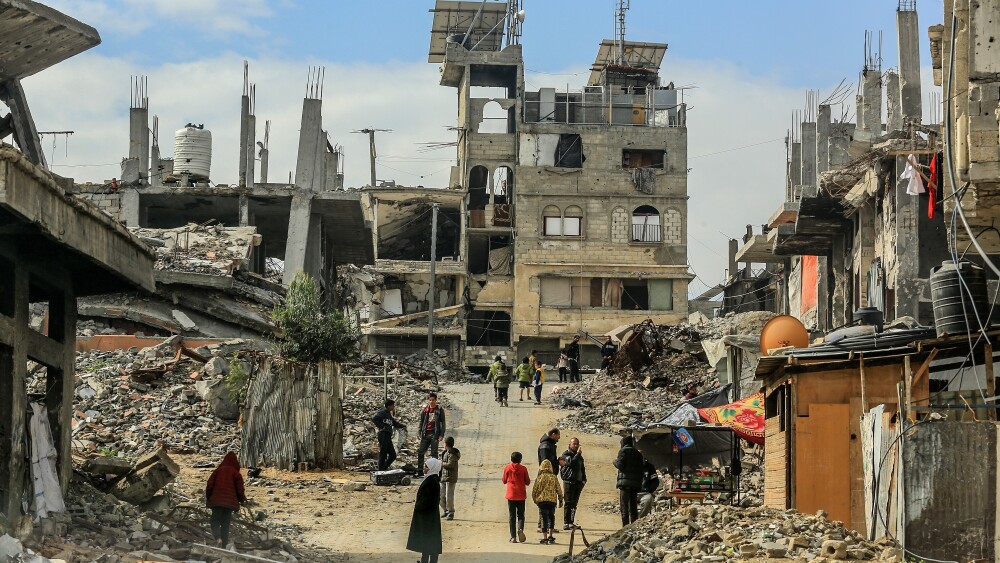Qatar’s financing of the U.S.-designated terrorist organization Hamas was the sine qua non for the group’s capability to carry out the October 7, 2023, massacre in southern Israel. The September 9, 2025, Israeli airstrike on Hamas leaders in Qatar, even if botched, reflects that Israel’s political leadership and its security and defense establishment have internalized that lesson of Qatari terror-finance in Gaza.
The Qatari regime pumped at least $2 billion into the coffers of Hamas over the last decade leading up to the October 7, 2023, massacre.
In late September talks with the White House regarding President Donald Trump’s twenty-point plan to end the war in Gaza, Israel’s government insisted that the Qatari regime should have no role in the “day after” the Gaza war ends.
The Qatari regime pumped at least $2 billion into the coffers of Hamas over the last decade leading up to the October 7, 2023, massacre. Hamas used the largely unregulated funds to purchase weapons and build its extensive tunnel system; Israel continues to destroy the over 300 miles of terrorist tunnels in Gaza.
Trump recognized the danger posed by Qatar during his first administration, when he said, “Qatar has been a funder of terrorism at a very high level” and announced that “the time has come to call on Qatar to end its funding … and its extremist ideology.”
The second Trump administration has been more tolerant toward Qatar, and Washington is advocating for Doha to have a role in Gaza Strip reconstruction. The Israeli news outlet Ynet reported on a compromise formulation between the United States and Israel, though neither side is detailing their agreement. By admitting Qatar back into Gaza, however, Israel would be doubling down on a security blind spot that enabled Hamas’s attack.
Qatar’s sponsorship of Hamas terrorism has become a hot-button issue within Israeli politics. Knesset members of Prime Minister Benjamin Netanyahu’s Likud party seek to pass legislation designating Qatar as a “terror-supporting state.” After the military strike in Doha, Netanyahu declared, “I say to Qatar, and all nations who harbor terrorists, you either expel them or you bring them to justice. Because if you don’t, we will.”
In late September, Nir Barkat, a Likud party member and the minister for Economy and Industry, who expressed support for the anti-Qatar Knesset bill, told the German Bild that “Qatar is a wolf in sheep’s clothing” and the “biggest engine of antisemitism in the world.”
Qatar’s goal since the October 7, 2023, massacre has been to ensure that Hamas survives as a movement.
The Israel Defense Forces strike against Hamas in Doha has not led to a change in the Qatari regime’s behavior. Qatar has not evicted the Hamas terrorist leaders from its territory, and it continues its soft-power operation in the media to incite anti-Americanism and Islamist terrorism against Israel. In late September, Jaber Salem Al Harmi, editor-in-chief of the Qatari state-controlled Al Sharq news outlet, shared a video depicting Trump as a devil holding a pitchfork. Qatar’s newly appointed defense minister, Saoud bin Abdulrahman Al Thani, once posted a tweet stating, “We are all Hamas.”
Qatar’s goal since the October 7, 2023, massacre has been to ensure that Hamas survives as a movement. After the worst single-day slaughter of Jews since the Holocaust, Qatar’s regime refused to condemn Hamas and blamed Israel instead. “The Ministry of Foreign Affairs holds Israel solely responsible for the ongoing escalation due to its ongoing violations of the rights of the Palestinian people,” the Qatari government declared that same day.
Qatar sought to stop Israel’s war, declaring that it seeks to “prevent these events from being used as a pretext to ignite a new asymmetric war against Palestinian civilians in Gaza.” Qatar’s use of money to reconstruct Gaza could mean material and cash funneled to the remaining vestiges of Hamas and Palestinian Islamic Jihad, with the goal toward enabling them to rebuild their terrorist organizations.
Israel should not make the same mistake twice by trusting Qatar or, indeed, any regime whose goal is the expansion of Muslim Brotherhood ideology.



![“We see them test our troops. We see them carrying out attacks every week… [Hamas] injured and killed soldiers since the ceasefire began,” IDF Lt. Col. Nadav Shoshani told The Post at a military outpost in the central Gaza Strip on Thursday.](https://cdn-mef.meforum.org/dims4/default/126c66a/2147483647/strip/true/crop/2704x1520+0+140/resize/500x281!/brightness/16x0/quality/90/?url=https%3A%2F%2Fk2-prod-mef.s3.us-east-1.amazonaws.com%2Fbrightspot%2F3d%2F29%2Fd1c530464a578792da895f74a56f%2Fidf-soldier-silhouette-in-gaza.jpg)




